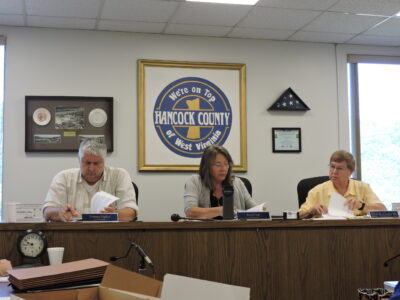Jefferson County commissioners hear water concerns
STEUBENVILLE — The owners of a Wintersville apartment complex that was more than $30,000 in arrears on its water and sewer bill a week ago has indicated it will pay the outstanding balance, Jefferson County Water and Sewer District Director Mike Eroshevich said.
Eroshevich said Greenwood National, the owner of the Ridgewood affordable housing complex, requested copies of invoices dating back to January. He said the property owner had made a $14,000 payment in April and two payments in June but was still behind.
“The situation escalated this year,” he said. “January is when they started to fall behind. Each month’s bill is $7,000 to $8,000 — they’re behind four months.”
Eroshevich said the property manager told her the owners had contacted her to request the invoices after the county commissioners met on July 24, when he’d alerted them that there was a significant problem.
“Hopefully, this will be resolved within the next few weeks,” he said.
Green National also owns the Heritage Place affordable housing complex in downtown Steubenville, the subject of ongoing litigation over a months-long boiler issue in the dead of winter that left residents in one building without heat. Some of those same residents had to deal with hot water outages because of a motherboard problem in a water tank, frozen pipes and an electrical issue. Residents there said their city water and garbage service had been shut off at one point for non-payment.
While those issues have since been fixed, Pamela Bolton, an attorney with Legal Aid of Southeast and Central Ohio, has asked a Common Pleas Court judge to appoint a receiver to handle Heritage Place’s business affairs. A hearing is scheduled for Sept. 26.
Eroshevich, meanwhile, told the commissioners Thursday that customers are still upset about a recent sewer rate increase, which he said was necessary to keep the department solvent. He’d previously said sewage is facing about an $800,000 shortfall, due primarily to Ohio EPA-mandated system upgrades: He said they’ve spent “more than $32 million in the last decade to construct new systems and to update and refurbish old ones” and they are currently under orders to upgrade the Barbers Hollow, Mellwood, Maplewood and Century Hills wastewater treatment plants to bring the effluent quality into compliance with the agencies and protect public health and the environment– upgrades that “could cost upward of $20 million.”
“As the largest geographic system in the state … we have three- to four-times the infrastructure to maintain as municipal systems spread out over a vast area with a limited number of customers. Only sound financial management has allowed costs, fees and user rates to remain as low as they have for decades.”
He told the commissioners he’d had an irate Smithfield resident in his office sharing her viewpoint.
“If she had let me get a word in, I would have told her, ‘What other organization has invested $6 million in your village in the past 10 years?” he said. “The water and sewer district — between a new water tank, upgrading the sewer system, the booster station in Brilliant and transmission line that sends the water out there — has invested almost $6 million in the village and $14 million in Amsterdam and we’re getting ready to spend another $10 million.”
“And for a minimal (number) of customers, if we had 500,000 people living in this county it would be easier, but that’s just not the case,” Commissioner Eric Timmons said.
Commissioner Jake Kleineke said that in a county of 65,000, “only 3,500 of them are on (our) sewers” and are paying for more than $30 million in upgrades.
“Most of the systems that we have, the EPA mandated previously for us to take over,” Commissioner Tony Morelli said. “Now, I wasn’t there, and I don’t want to say something wrong, but bad decisions were made. We’ve had to take over some crazy things. We have four sewage treatment plants, package plants, that we’re responsible for (serving) less than 200 customers.”
He’s said those four package plants, built by private developers to service small housing complexes in outlying areas, are failing and will cost about $2 million each to be upgraded to comply with mandatory OEPA upgrades.
“We’re getting letters and e-mails, and I just don’t think that people really understand the increase is not near as much as a lot of other things since COVID,” he said. “People pay more for a (burger) or a pack of smokes (and don’t think about it), but raise water and sewer prices and they don’t like it and that’s what happens. It’s politics. The rates should have been raised a long time ago, so we don’t get this far into debt and then have to do it and do a bigger (increase.)”
In his annual report, Eroshevich said the general public tends to think their tax dollars pay for the water and sewer system.
“Though some tax money has been utilized for projects, the only money available to the (department) for day-to-day operations and the resulting expenses is an enterprise fund,” he said. “The money in this fund comes from customers paying their bills each month” and by law can only be used for that.
In addition to covering monthly expenses like labor, insurance, fuel, electricity, materials, equipment, debt service, engineering services, facilities maintenance and upgrades, road paving after pipeline work and lab and permitting fees, the enterprise funds also pay for purchase of critical materials and potable water. He said his employees spend “hundreds of man hours cutting grass, plowing access roads, restoring property damaged while crews repair water and sewer lines, road paving after repairs and other general maintenance.”
“Some departments contract these services out to private contractors, but (our department) keeps these services in-house to help control costs and keep them low,” he said.
Among other things Eroshevich said last year the department “purchased and pumped more than 956 million gallons of water — that’s about 2.6 million gallons per day — servicing about 8,000 of our customers and supplying water.”
He said they also made 172 water line repairs and repaired 62 service lines, rehabilitated two water tanks, collected more than3,000 water samples for testing, completed design of the water meter replacement and SCADA/telemetry projects, both of those now in construction.
SCADA is a complex system of computers, monitoring devices and control panels that help all of the department’s infrastructure assets to communicate with each other, while the telemetry project allows the system to record and transmit instrument readings. Eroshevich said the two systems work together to record current conditions within the system and relay them back to corresponding equipment as well as the department’s service center — giving them the ability to run the system automatically, ensuring consistently full water tanks and automatic water and sewage pumping.
“SCADA replaces the old system that is outdated,” he said. “Parts are hard to come by due to their age. That system monitors pumps, pressure in the system, flow rates and how much water is in each tank. Without it there would be major issues and service disruptions.”
He said they’re replacing old, outdated meters that no longer transmit readings.
“Old meters also run slower, which leads to water loss and loss of revenue,” he said. “New, accurate meters will cut down water loss and be more accurate. They also will transmit data to the office on a daily basis which will help the department monitor usage and help customers see how much they are using and troubleshoot leaks in service, their line and in their home.”


